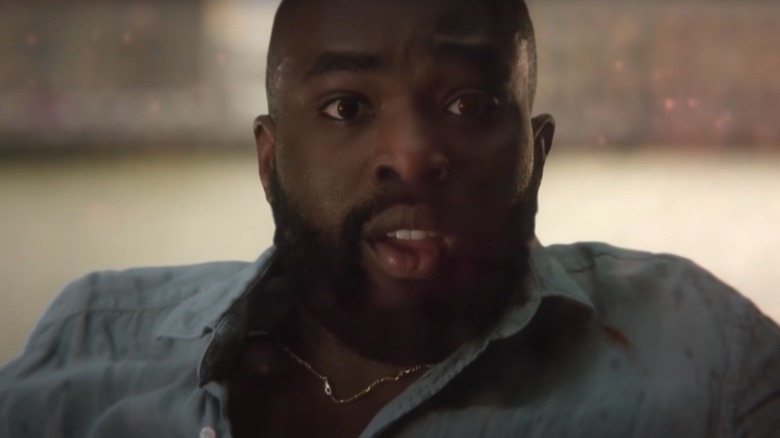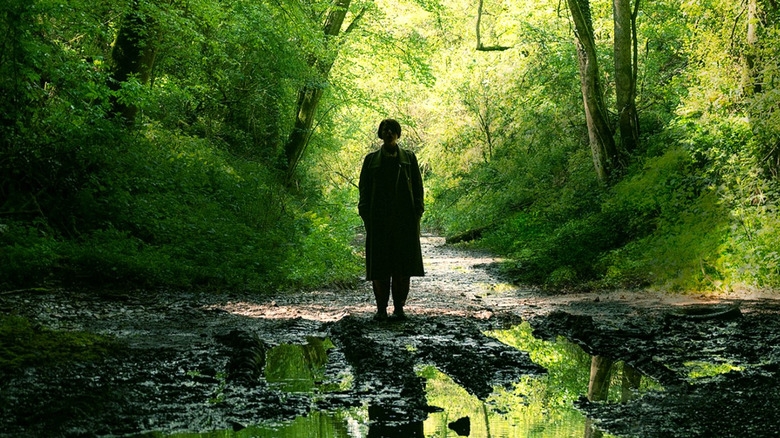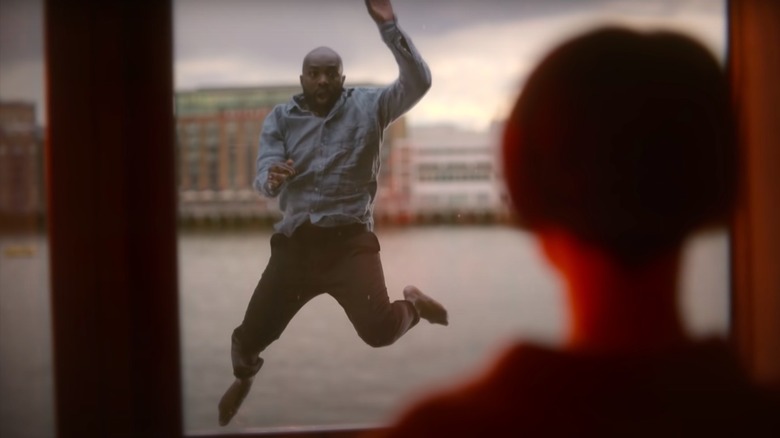Men Star Paapa Essiedu On Haunting Jessie Buckley [Interview]
Paapa Essiedu has one of the most difficult, and perhaps easiest jobs of Alex Garland's surreal folk horror film "Men" — he barely appears in the film at all. But while Essiedu only had to show up to set for maybe a handful of days, the challenge lay in making an impact in his few key scenes so that his character, Harper's (Jessie Buckley) former boyfriend James, would loom over the entire film.
"It felt like a strange experience," Essiedu told me in a phone interview with /Film ahead of the release of "Men."
Essiedu's James haunts Harper, though not in the way that you might expect. It's not his face she sees, but the face of Rory Kinnear, who plays most of the men in "Men." But James, who had a much bigger (and dangerous) impact on Harper's life, barely appears apart from a few flashback scenes and one strange vision — all of which are extremely intense, and full of violence. It was a challenge that Essiedu faced head-on.
"The scenes are so high energy and high acting and high commitment that really sometimes what you've got to do is you have to go back and get your fury to a person across from you," Essiedu said.
I chatted with Essiedu about working with Alex Garland, playing the bad boyfriend, and how one of the movie's most intense scenes involved a trampoline.
'That made me think twice about what was actually going on inside Alex Garland's mind.'
Paapa, you have the difficult role of playing a character who doesn't really appear in the flesh in the film. He looms over the entire film. He appears in flashbacks. When playing a role like that and one whose characteristics we only know through Harper's point of view, how did you approach it?
Yeah. It's interesting because, obviously, that's the first aspect that you get from watching the film, but I kind of had to think of it from my perspective or from James' perspective and playing the scene. So, the scene kind of, even though it gets kind of split into three or four different segments, we tried it all as one thing.
We spent a lot of time talking, and a lot of time building the foundations and structures and discussing what people thought that relationship was, what that relationship can be, and why it got to the point that it had. And then it was just playing it. Obviously we, as the audience, will see it from Alex's point of view but you had to — it felt like a strange experience.
So did you have those discussions with Alex? Or was it something that you just had built up in your own mind, or with Jessie?
Yeah, we were lucky that we had two weeks for rehearsal before we started filming. That rehearsal period was just very free fall, it wasn't like we did the scenes apart, it was just like each day we woke up early, then it's just, chat about the tricks and ideas that we would have, and different bridges [between] the characters. [It was] that kind of relationship. But yeah, Alex is a very competent director so everything was a two-way street.
What was your impression of the script when you first read it? What drew you to it specifically?
Super intense. I thought it would be just a super intense piece of writing, that made me think twice about what was actually going on inside Alex Garland's mind but, I found it very effective and very scary if I'm honest. I read it maybe two or three times, then me and Alex sat down just trying to [talk] about the film and everything else. I find him such an interested, curious individual. Very inclined to be around [him] and to get into conversation with. Yeah, it was surreal.
All your scenes are full of intense emotions. What was it like to go in shoot that, and then come back for the final, more surreal scenes that you appear in?
Yeah, weirdly we actually shot the final scene before we did the main scenes but, it was on the last day ... that we actually shot that scene between me and Harper because the rest of the film is shot [chronologically], I recall. Yeah, I kind of liked to spend some time in the dressing room at the start to shoot and when I'm waiting on a shoot kick back and then you can just come watch at the back.
The scenes are so high energy and high acting and high commitment that really sometimes what you've got to do is you have to go back and get your fury to a person across from you, when the person across from you is just a prop thing, you are in so intense[ly].
'That was really an illusion but, it's actually quite more simple than you think.'
It's such a small cast and, like you said, you only had a handful of scenes. Doing your scenes was it like doing a play in a way? You just go in and have these very high-energy, high-intensity scenes, and then, that's it?
Yeah, kind of unconventional because obviously [I'm] someone [who] is just filming ... in one place. The cast is very small, we all knew each other very well, spent time rehearsing before we started filming. It's very not typical experience, it's more modest.
It was definitely, I find, sometimes like a play watching it back as well. Obviously, it is way more, it's really surreal, so that is bigger than most plays but it feels like you have touched the same situation.
I wanted to ask about the scene where your character is falling and, we watch it in slow motion Harper explains this is how she felt like she experienced it. How was that shot? Because it's something that there is a lot of emotion going through both of your faces in that scene, and yet, to do that because of gravity and physics, that kind of scene would take place very quickly. How did that play out?
Yeah, that was really an illusion but, it's actually quite more simple than you think. Let's just say we found ourselves in a very, very big room with a very, very big trampoline. And then after that there was some tech with just that kind of do something that makes it realistic. Yeah, me and Rory, because there was originally a scene where one of Rory's characters also descends through the air. And so Rory and I spent many hours on the trampoline ... trying to learn how to jump very high and spin. Rory's actually very good at it, he's got two kids.
So Rory Kinnear plays the bulk of the characters in this film. But, towards the end the two of you share the role of antagonizing Harper, to speak of it without spoiling it too much. What was your specific reading of that scene?
My specific reading ... it is the arc, I suppose, of where we meet James and where we see the relationship and then what he ends up doing. By the end of the film [Harper] has been haunted by so many different ghosts of [James] caught in a multitude, caught in some alter egos. But I felt like there was something about the full stop that, by that final scene of them being together and her asking that question, "What do you want of me?" and him answering by laughing. To me that underlines the futility. And it's sad but it's what's happening in their relationship.
"Men" is playing in theaters now.


